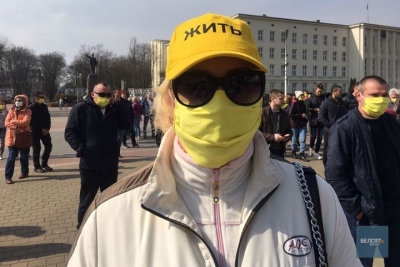“The protests of the citizens of Brest are the strongest expressions of civil society after years of apathy. The last similar case was a movement against the construction of the nuclear power plant in Astravyets, which ended up by persecution of activists and international investigation,” says Martin Skalsky, chairman of Arnika - Citizens Support Centre, a non-governmental organization based in the Czech Republic. “Despite the threats, people do not give up on defending their right to a healthy environment,” Skalsky adds.
The protests have been aimed against the «iPower» battery plant owned by a Chinese corporation. Its construction began in 2017 in the Brest Free Economic Zone after the project received positive Environmental Impact Assessment (EIA) conclusion. However, the citizens are concerned about the factory and in January 2018, they started a public campaign against it. More than 40,000 people signed the petition. The only public gathering permitted by the authorities happened on April 29, 2018. Since all other protests were deemed illegal, the citizens voice their opinion by meeting at Lenin square every Sunday to “feed the pigeons”. This form of protesting started on February 25, 2018. Since then, many people have been detained and fined anyway.
"Over the entire period of protests, local residents, human rights defenders, as well as journalists, were harassed, pressured, and persecuted in various forms. In addition to administrative arrests, preventive detentions and fines, other forms of persecution and pressure were also observed against activists: cases of defamation, searches of activists and their relatives and criminal charges," said Marina Dubina, a representative of non-governmental organization Ecohome based in Minsk.
Persecution of the citizens of Brest for protesting against the construction of accumulator plant in Belarus:
Fines amounting to 49,141 Belarusian rubles (about 18,600 euro)
Arrests for a total of 130 days.
Approximately 67 people detained.
(During the period from February 25, 2018, till May 18, 2020)
A similar case occurred in 2012-2013 when the citizens of Belarus were opposing the plan to build a nuclear power plant at Astravyets, located on the border with Lithuania and less than 50 km from Vilnius. Detentions, arrests and searches of the protest leaders resulted in a complaint to the Compliance Committee of the Aarhus Convention of breaching the citizens' rights (3). This is one of the few remedial mechanisms available, as Belarus is not a member of the European Court for Human Rights. In March 2020, the Committee published a report expressing serious concern and noting that the situation in Brest "demonstrates that persons seeking to exercise their rights under the Convention in the Party concerned remain at risk of penalization, persecution or harassment for doing so. Based on the information before it, there is no indication to the Committee that the situation is improving in this respect. The Committee considers this to be gravely concerning." (4)
Sources:
[1] ENG 2020 The controversial battery plant in Brest, Belarus, began to operate despite long-lasting citizens' protests (Stop Persecution)
[2] ENG 27/5/2020 Infographics of Brest persecutions (Ecohome)
[3] ENG Antinuclear activists in Belarus (Stop Persecution)
[4] ENG 9/3/2020 The international public concerned by persecution of defenders of environment in Belarus (Stop Persecution)


